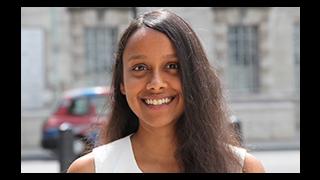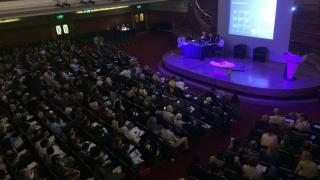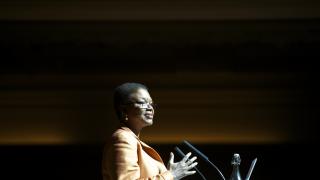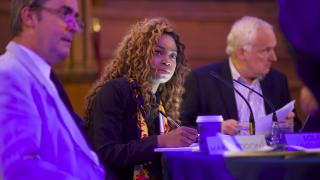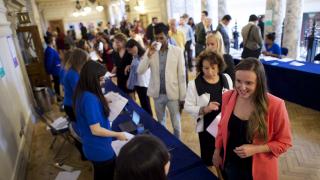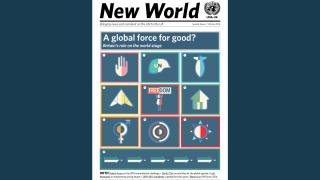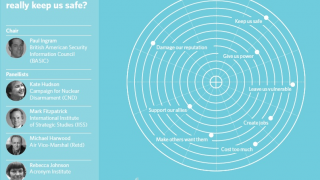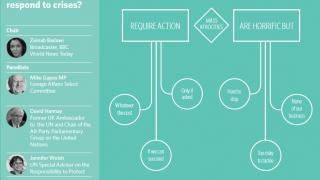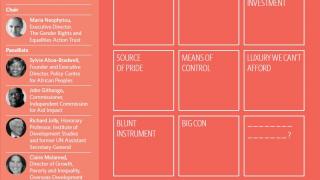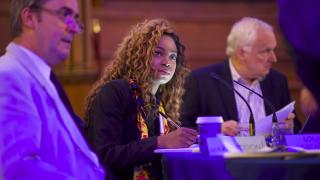
UNA-UK believes that the UN delivers real gains for people around the world, including the UK, from creating human rights laws to tackling issues like climate change that require global solutions. In our increasingly interconnected world, the UK stands to gain from an active foreign policy that sees the UN as an essential tool for achieving its global objectives.
Public support is essential for such an agenda to succeed. At UN Forum, we put our views to the test. Ahead of the event, we commissioned a poll (see chart above) on attitudes to the UN. A majority of respondents – over 60 per cent – felt that the UN was a valuable institution ‘for the world’. There was less certainty about the value of the UN to the UK, and to individuals in this country.
Guided by Nik Gowing, the Forum’s opening panel explored the relevance of the UN to ordinary people. The discussion is summarised here. Visit www.una.org.uk/forum for the full recording.
Nik Gowing (NG): Throughout the day we will use comments and questions to shape our discussions. Let me give you an idea of what people have been saying via email, social media and the question boards outside this room:
- I can see that the UN does good things around the world, but it doesn’t do anything for me, so why am I paying for it? (Daniel Hallam)
- The UN talks and talks and does nothing. (Selene Beauregard)
- Why is the British public not told about the return of investment from the UN? (Suheil Sharyar)
- How can we who support the UN get our message across and what role can the media play? (Gillian Briggs)
Peter Kellner: Some of these points reflect a survey we carried out for UNA-UK. We asked people which issues most influence their voting choices. It will not be a surprise to hear that the economy came top. Foreign affairs came last. The public are not engaged with these issues. When particular things happen – in the EU or Syria, for example – there will be a spike in interest but people do not follow foreign affairs closely. The poll also found some scepticism towards overseas aid and the use of force for "broader global interests".
When I attended my first UNA-UK event in the 1960s, I was motivated by the need to create a safer, fairer and more sustainable world. I think the task for UNA-UK is to show how closely connected our world is now and how international involvement is of practical benefit to the UK.
NG: This chimes in with a question from Hilary Haystaffs – what is the point of the UN in developed countries?
Mark Seddon: None of us is immune to global challenges. Issues like climate change, terrorism and pandemics could have serious consequences for the UK. I think it is different in countries like the UK
where these challenges can seem remote. In developing countries, where people can observe what the UN is doing and the impact it has, it is a different story. But we do have an enormous job to do in terms of communications, media and outreach. People around the world can get information at the touch of a button. The UN has a good story to tell and we need to get it out there, whilst being honest about the UN’s limitations. We should say: if you want us to do more, put pressure on your governments.
NG: There are a lot of questions coming through on youth. Lola, how do your peers feel about the UN?
Lola Mustapha (LM): Firstly I’d like to say that it’s amazing to see so many young people in the room today because to be honest, a lot of the young people I meet do not know what the UN is. We need to reach those who are not engaged in national politics, let alone global issues. The UN is a great institution. Global issues need global responses. Young people should be involved in that process.
NG: How can we achieve that?
LM: The first step is for young people to learn about the UN and why they should care about it. Then, they should learn how to have input. There used to be a programme that enabled young people to go to the UN as part of the UK’s delegation. I think that’s been cut. That’s a shame because experiencing how it works would help us to understand the UN. If we don’t, how can we influence decisions that affect our lives?
Karen Pierce: I agree that we need to find imaginative ways to introduce the UN to new audiences. At the UK Mission in Geneva, we have been discussing a youth Human Rights Council. In terms of how the UN relates to our lives, this morning, getting off the plane, I found myself dealing with the World Health
Organization about the Ebola outbreak. If you care about global health, you should care about the UN. If you care about cyber issues, you should care about the UN’s work on privacy and security. If you care about natural disasters, you should care about the UN’s humanitarian work. There are lots of parts of the
UN that touch the lives of millions of ordinary people.
The Security Council can seem remote. Like one of the comments said – it talks and talks – and it doesn’t always come to the right conclusion. Sometimes it
does. In Cyprus, South Sudan and Mali it has been able to take action. On human rights, if not for the UN, a lot of countries wouldn’t have the incentive to improve their systems. The UN is a multiplier of our interests, whether they are foreign or domestic interests. What the YouGov poll shows is that we are not good enough at telling this story.
NG: Here’s a question for Malcolm Rifkind from Helen Doherty – how can we make the case for the UN when so many people in this country have a pull up the drawbridge mentality?
Malcolm Rifkind: We must make the point that the UN is more than the Security Council. Many people in Parliament, even some in this hall, will not realise that 120,000 peacekeepers are currently operating in 16 countries. Not everyone will know that the World Food Programme fed over 90 million people last year, or that 34 million people have been helped by the UN Refugee Agency. There is also little awareness in this country and elsewhere that the UN operates on a shoestring, when you look at the tasks it is expected to
fulfil. The second point to get across is that when the Security Council fails, it is not the fault of the UN as an institution but of governments.
I don’t think the public is hostile towards the UN. The extraordinary numbers in this room demonstrate that there is a substantial core of the population that is positively enthusiastic
about the UN. There is also indifference and disinterest. I wouldn’t get alarmed about that. People live their lives; they have their own priorities.
NG: We have some comments from the floor from former UN staff: Ahmad Fawzi, who used to run the UN information centre in London and who recently supported Lakhdar Brahimi’s mission in Syria; and Margaret Anstee, former UN Under-Secretary-General and first woman to head a UN peacekeeping mission.
Ahmad Fawzi: The UN has been grappling with these issues for 20 years. We’ve even discussed encouraging UN themes in TV shows. One of our constraints is funding – public information budgets
are cut year on year. The UN should be able to enlist specialists and embed communication strategies
into everything it does. Education is also vital. Every UN member state should have a subject in the
national curriculum that deals with the UN and global issues.
Margaret Anstee: I think we need to remember the power that the media and public opinion can exert over
government policy. In my last formal UN posting in Angola, there was so little interest in the situation I called it the forgotten crisis. As a result, governments refused to approve the necessary peacekeeping troops, which could have brought about peace. What people think matters.

